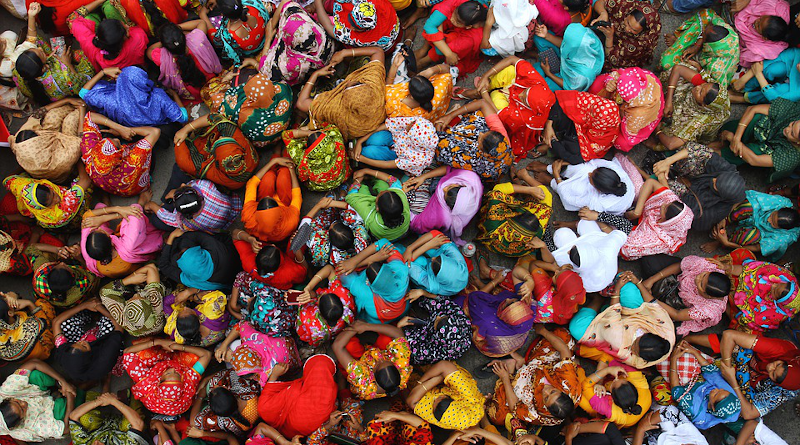Neo-Fascism And Patriarchy In India – OpEd
By Yanis Iqbal
March 8, 2022 – International Women’s Day – should prompt the Indian citizenry to reflect on the perils of the current politico-economic situation. With the rise of the Bharatiya Janata Party (BJP), the entire Indian society has been undergoing an unprecedented process of fascisation, which is reflected not only in the electoral victories of right-wing formations but also in the legitimization of everyday violence and cruelty, the exponential increase in economic inequality, the xenophobic manipulation of collective resentment and rage, the coordinated assault on the constitutional plinths of democracy, and the consolidation of vigilantism.
Patriarchy forms an indispensable ingredient of fascism. Thus, BJP’s growing dominance has meant the tightening of the androcentric noose around women’s necks. On February 8, 2022, Muskan Khan, a Muslim student, was heckled by a mob at the gate of PES College of Arts, Science and Commerce in Mandya, Karnataka because she was wearing a hijab. Hundreds of students, donning saffron headgears, chased the girl and raised the “Jai Shri Ram (praise Lord Ram)” slogan. On January 1, 2022, Indian Muslim women were listed for auction on “Bulli Bai” – an app hosted on GitHub – along with their pictures sourced without their consent from social media apps. Earlier, in July 2021, a similar app called “Sulli Deals”, which was also hosted on GitHub, had offered Muslim women for auction with their photographs doctored without their permission.
Assaults on Muslim women in India have been normalized under the ruling dispensation. Hindutva – the political ideology followed by BJP – has an essential sexual dimension, which includes the cultivation of an aggressive Hindu male capable of combating the threat posed by a hypermasculine religious enemy, namely the Muslim. Dibyesh Anand notes: “Hindutva is porno-nationalism in its obsessive preoccupation with the predatory sexuality of the putative Muslim figure and the dangers to the integrity of the Hindu bodies. The proponents of Hindutva mobilize and generate negative stereotypes of Islam and Muslims to legitimize violence against actual Muslims living in India.” These biased framings comprise the positing of the polygamist Muslim male and the degenerate Muslim woman as the counterparts to the chaste Hindu male and the motherly Hindu woman, respectively.
Anand remarks that the “porno-nationalist imagination of the Muslim Other performs two moves at the same time. It assures the Hindu Nationalist Self of its moral superiority; yet, at the same time, it instils an anxiety about the threatening masculine Other.” The unease over emasculation is overcome through violent deeds in which libidinal energies are converted into the cardinal virtues of fascistic attitudes and activities: duty, honor, and loyalty. These explosive feelings were fully articulated in the 2002 communal riots that took place in Gujarat. Public displays of mass murder were accompanied by verbal abuse, beatings, mutilation, castration and rape. Babies and fetuses were rampantly killed and mutilated. Neo-fascist storm troopers shifted their modality of sexual violence from a person to person rape to that of gang rape, thus morphing rapes into public, collective, spectacular acts. As Harbans Mukhia writes:
“Rape itself is transformed here from an ugly manifestation of lust and sadism, but one that is kept under the wraps by its perpetrator, into a political statement, a weapon of war against fellow citizens, an instrument of conquest…It also gets transformed from an individual’s dark act done under the night’s cover or behind the blinds into one which in its public manifestation implicates the spectators as accomplices and therefore seeks to establish group solidarity of victors even as it aims at demolishing the solidarity of the vanquished through sheer demoralization, and public demonstration of their helplessness in protecting their honor, invested in the woman’s body. Rape thus becomes an occasion for collective and public celebration rather than individual and private shame. The rapist emerges as a hero.”
The over-sexualization of Muslims naturally leads to the hardening of hierarchies within the Hindu community. This is evident in the Hindu Right’s repeated invocation of the Manusmriti, the ancient Sanskrit legal text that contains some of the most patriarchal aspects of Hindu law. In the Hindutva worldview, women’s chastity and maternity become important for their role as reproductive vessels for the nurturing of the Hindu race and its purity. This association of femininity with maternality – partly a legacy of the “Mother India” trope used by the anti-colonial movement – unleashes a violent repression of issues related to sexuality, desire and choice. The idealization and subsequent desexualization of women as national mother means that patriarchal brutality against them can be justified as violations of morality.
“The deathly acts of the cadres of Hindu supremacism,” comments Himani Bannerji, “are projected as social/collective punishment for ‘erring’ women and overreaching religious minorities. Muslim, other minority and Dalit women are specially targeted because Hindu Brahmanical masculine virtue must undertake it as a duty to preserve social order. These punishing acts range from caste panchayat (council) fiats to honor killing to gang rapes, all under the rubric of preserving moral purity. Rape then branches out from within the marital and family fold and private actions of individuals to the status of social or civilizational corrective.” The elimination of these patriarchal relations requires a comprehensive social programme that can uproot the broader cultures of cruelty (routine violence against working people and oppressed castes) within which practices of communal-fascistic violence are effectuated. Therefore, what we need is a conjunctural struggle against right-wing extremism and a structural movement for anti-neoliberal radicalism.

